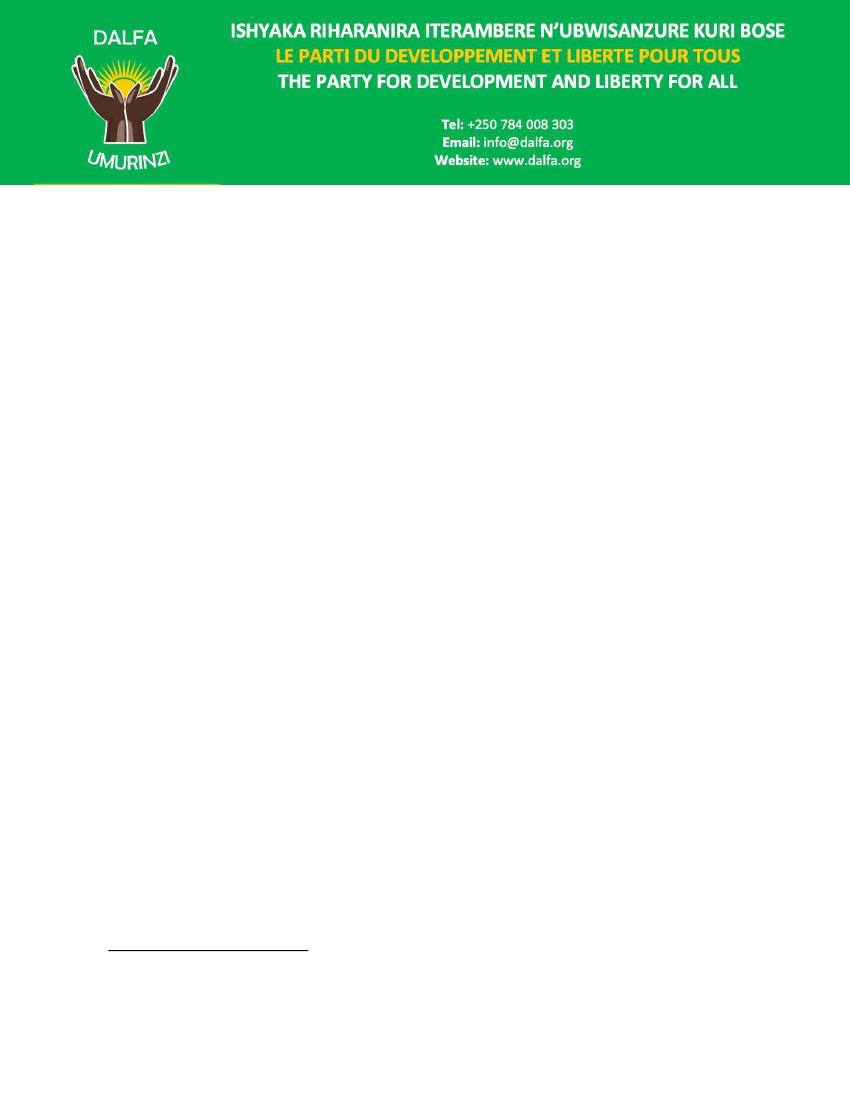
Bertel Haarder
Chair of Committee on Foreign Affairs
The Danish Parliament
Kigali, 4
th
May 2021
Mr Haarder,
We are reaching out to provide our perspective on Rwandan government and what in our view is a viable solution to
improve governance in our country, Rwanda.
The Rwandan government has registered some achievements after the end of the civil war and the genocide of the 1990s.
Security has been maintained across Rwanda, governing structures have been established and legislations guiding the
state’s activities have been reformed.
Nonetheless, we are concerned with our government’s abuse of human rights and violation of democratic values that have
been going on for over a decade. The decrease of participation, rights, inclusion and equality in our country over the past
ten years can also be observed on the Mo Ibrahim Index of African governance
1
.
Although the Rwandan government has ratified most international and regional human rights treaties, has a constitution
that guarantees human rights to its citizens, it continues to violate its citizens’ human rights. Arbitrary detention, including
prolonged pre-trial detention, has been reported from our country by United Nations bodies
2
. Moreover, political
opponents, human rights defenders and journalists face reprisals, death, enforced disappearance, harassment and broadly
defined offences for criticizing the government in Rwanda. Many of our active supporters and independent activists have
been victims of these acts
3
. Our government records of human right abuses have been extensively described for over a
decade in the EU annual Reports on Human Rights and Democracy published on European External Action Service website
4
.
Moreover, during the 37
th
Session of Universal Periodic Review on Rwanda’s human rights, held in Geneva in January 2021,
representatives of various European Union member states voiced their concerns over human rights abuse in Rwanda to our
government delegates
5
.
The ruling circle in our country claims to be practising power-sharing consensus democracy with the intent of overcoming
ethnic divisions and accelerating development. However, there is no independent mechanism to evaluate the fairness of
implemented power-sharing system. Political participation is limited to selected groups. For instance, only political parties
affiliated to the ruling party and part of an established political parties’ forum are allowed and are financially supported to
operate as the opposition in Rwanda. This leaves no space for genuine opposition parties able to provide checks and
balances against our government. A decade has passed without our opposition political party having been registered and
approved to operate in our country. As a result, political elections are always characterised by limited choice in Rwanda. In
particular, serious contenders in Rwanda’s presidential elections have regularly been excluded through the use of fabricated
charges. We ourselves have been the victims of these heinous practices
6&7
.
Rwandan citizens have the constitutional right to freely express themselves; however, freedom of expression to criticise the
government or the ruling party is repressed in our country. Rwanda ranks 155
th
out of 180 countries in the Global Press
Freedom Index 2020
8
.
The Rwandan constitution also provides separation of power to guarantee the rule of law. Nonetheless, the power remains
with executive. The judicial system is influenced by the executive that appoints it, especially when ruling on high-profile
https://mo.ibrahim.foundation/iiag/downloads
https://www.humanrightsinitiative.org/publication/easier-said-than-done-estd-report-based-on-the-42nd
3
https://www.hrw.org/news/2019/08/15/rwanda-disappearances-require-credible-investigations
4
https://www.state.gov/reports/2019-country-reports-on-human-rights-practices/rwanda/
5
https://rw.usembassy.gov/u-s-statement-at-the-universal-periodic-review-of-rwanda/
6
https://www.hrw.org/news/2010/08/02/rwanda-silencing-dissent-ahead-elections
7
https://www.amnesty.org/en/latest/campaigns/2017/08/rwandas-repressive-tactics-silence-dissent-before-elections/
8 https://rsf.org/en/rwanda
1
2